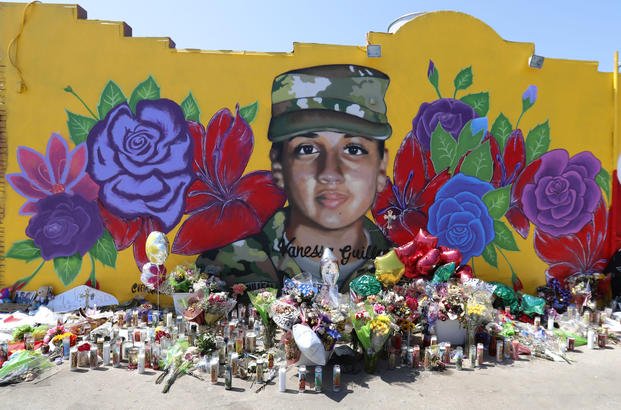The opinions expressed in this op-ed are those of the author and do not necessarily reflect the views of Military.com. If you would like to submit your own commentary, please send your article to opinions@military.com for consideration.
"What's happening at Fort Hood?" That's the question I asked a congressional committee on July 29, 2020.
The hearing was designed to examine sexual harassment at Fort Hood, Texas, held less than a month after the dismembered and burned remains of Spc. Vanessa Guillén, who had served at the base, were found. Less than three years later, I find myself here again, facing yet another death of a young, Latina soldier that is being disregarded by the command of Fort Hood.
Pvt. Ana Fernanda Basaldua Ruiz died earlier this month after experiencing sexual harassment, her family has told news outlets. So I repeat, what is happening at Fort Hood?
After Guillén's killing led to protests, an investigation released in December 2020 found "major flaws" at Fort Hood and a command climate that then-Army Secretary Ryan McCarthy described as "permissive of sexual harassment and sexual assault." The Army ordered 14 officials, including several high-ranking leaders, to be relieved of command or suspended.
A study released in 2021 by the Rand Arroyo Center, a federally funded research group, found that women at Fort Hood had a far higher risk of sexual assault than the average woman in the Army. Researchers found that the total sexual assault risk to Army women at Fort Hood in 2018 was 8.4%, compared with a 5.8% risk for all women in the Army.
As an advocate myself, and as part of a movement called "the grassroot," we continue to work tirelessly on efforts to eradicate the permissiveness of sexual harassment and sexual assault in the military. My biggest concern is that, with changes in the 2022 defense policy bill meant to help combat sexual harassment and assault, bases like Fort Hood have ostensibly declared victory. But how will the Department of Defense and the Department of the Army keep them accountable? Why does Fort Hood continue to foster this type of command climate? I feel that Fort Hood as a whole needs to be investigated, not just individual units that make headlines.
This case is all too personal. I entered the military at the age of 18, an Afro-Latina woman hoping that I could make a career out of military life. I wanted to create equity and show my patriotism toward this country, but in 1992 it was taken away from me by the act of assault. You hear these stories all too often. What I've learned in this space is that sexual harassment and sexual assault do not discriminate. This is a human issue, one that can be a major problem and should be a priority for the military. Because as numbers in assault and harassment go up, individuals wanting to join the military will start going down. Current Army Secretary Christine Wormuth has publicly said that concerns about assault and harassment are already having an impact on recruiting.
Prior to my 2020 testimony, 23 soldiers stationed at Fort Hood had died or been found dead that year; four were homicides, and seven were suicides. Only one death occurred in combat. How do these numbers happen? What type of place fosters a climate that makes individuals want to take their own lives? What type of homicides are taking place within a military installation?
What's even more disturbing is that all of this takes place behind a secured fence. If you're not privy to being in the military space, you have no idea this is going on. Tell me, shouldn't that make you concerned?
And now another death, the case of Basaldua. The story sounds the same: A young Latina soldier, who always aspired to become part of the military, gets harassed and ends up dead. Where did it take place? Fort Hood. The Army clearly is not being transparent with what happened, and the family needs answers because they need to grieve. Fort Hood is not allowing them to do so.
-- Lucy Del Gaudio is the senior manager of diversity, equity and inclusion at EssilorLuxottica and an Army veteran. She currently serves as the chief operating officer of The Pink Berets.















